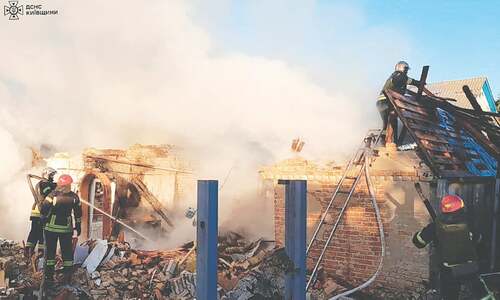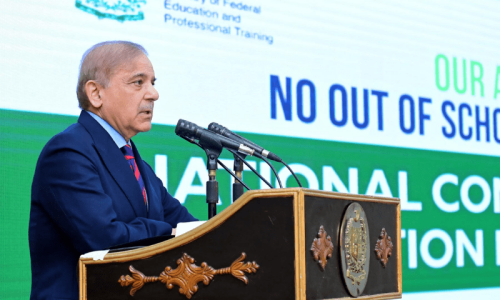TIMBUKTU: There is a proverb in Timbuktu, the legendary medieval city in Mali's desert, that says: “The ink of a scholar is more precious than the blood of a martyr.”
What Ahmed Baba, the 16th-century intellectual who said it, would make of recent developments is hard to imagine.
At the multimillion-dollar Timbuktu institute bearing his name, fragments of ancient texts litter the corridors. The charred remains of not just scholarly ink, but the antique leather-bound covers that protected them against the harsh desert elements are blown by the hot Saharan wind.
During the last days of the Islamist occupation of northern Mali, the Al Qaeda-linked groups who seized control of the territory for almost nine months turned on the Ahmed Baba Institute. In what many people believe was a final act of revenge, and a senseless crime against some of Islam's greatest treasures, they set the manuscripts alight.
“When the French started bombing, [the Islamists] set the manuscripts on fire as they were leaving,” said Abdoulaye Cisse, interim director of the institute.
“Even after most had fled the town, a small group of jihadists returned to make sure that the fire was still burning.”
“We are all Muslims, and in Timbuktu our practical version of Islam has existed for centuries,” added Cisse, a native of the city who remained there throughout the occupation.
“But they practise an archaic Islam and do not consider these writings as the authentic Qur'an because they cover not only religion but science, astronomy, history and literature.
That's their ideology and we don't support it.”
Cisse, who wears a distinctive silver ring engraved with an Islamic blessing that he had to remove under Islamist rule, foresaw that Timbuktu's occupiers could target his precious charge.
He and colleagues in Bamako, along with guards at the institute, the nightwatchman and his son, and numerous co-operative drivers and boatmen, worked for months by night, carefully packing most of the institute's 45,000 manuscripts and ferreting them away by road or pirogue boat to the capital in the south.
“It was a dangerous thing to do, we would have been punished if we had been caught,” said Cisse.
“But people really came together to help us. Every time we told them what they were carrying, they all kept it secret and kept them hidden until they left the occupied area.”
These ancient manuscripts, which could number up to 400,000 across the region, are a source of pride in Mali—and across sub-Saharan Africa.
As Africa gained independence from European colonial powers, the texts—the oldest of which date from the ninth century—became a means for the
pan-African movement to refute racist notions of a primitive, unlettered continent with no written history.
“People think that African history is oral, that the blacks were not writing until the white man arrived in Africa,” said Cisse. “But we know written literature. That is our mission—to one day recreate the history of Africa through the knowledge contained in those manuscripts.”
Timbuktu, which is now a Unesco world heritage site, was founded in about AD1103 and flourished as a commercial hub of the caravan trade between black Africa and the Maghreb, Mediterranean and Middle East.
The Ahmed Baba Institute, opened with much fanfare by the former South African president Thabo Mbeki in 2009, has just received about GBP65,000 in funding from Saudi Arabia to digitise its manuscripts.
“We want to digitally secure all the manuscripts before they are brought back to Timbuktu,” said Cisse. “But then they must be brought back. The manuscripts are meaningless if they're not in Timbuktu.”
An unintended consequence of the Islamist occupation of the city has been a renewed global focus on the priceless manuscripts, which although mostly written in Arabic also include centuries-old writings in Greek, Latin, French, English and German.
But while the Ahmed Baba Institute is painstakingly working to preserve preserving this history, other manuscripts in Timbuktu are faring less well.
By arrangement with the Guardian












































Dear visitor, the comments section is undergoing an overhaul and will return soon.